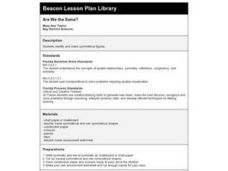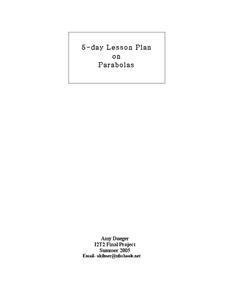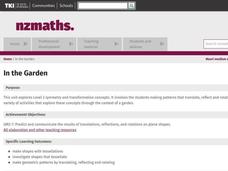Curated OER
Symmetrical Designs with Pretzels and Marshmallows
Fifth graders create designs that have lines of symmetry using pretzel and marshmallows. In this symmetry design lesson, 5th graders work in groups using graph paper, rulers, and toothpicks to plan their own lines of symmetry design....
Curated OER
Are We the Same?
Pupils define and discuss symmetry, line of symmetry, and congruency. They cut shapes out of construction paper, identify the line of symmetry, and if they are symmetrical and/or congruent.
Curated OER
Transformation
Third graders investigate symmetry by reflecting objects in different angles. In this geometrical transformation lesson, 3rd graders define the terms translation, rotation and reflection in order to physically turn geometric...
Curated OER
Describing Animals
While a short review of animals and their classifications, this could be useful when discussing this topic in the classroom. There is a list of questions at the end to help review the main ideas. Reptiles, amphibians, and mammals are...
Curated OER
Reflecting a Rectangle Over a Diagonal
Use the handout as guided or independent practice in drawing a reflection of a rectangle over a line. Three rectangles are provided for practice in addition to a critical thinking question.
Curated OER
Geometric Transformations
Learners examine images and preimages of a mapping and identify isometry. They view images by M.C. Escher, observe teacher demonstrations, and create a translation image, a rotation image, and a dilation.
Curated OER
Magnificent Mandalas
Learners examine the principle of radial symmetry and apply it to an original mandala design. They draw a design using organic and geometric shapes, repeating the design symmetrically around the paper.
EngageNY
Construct a Perpendicular Bisector
How hard can it be to split something in half? Learners investigate how previously learned concepts from angle bisectors can be used to develop ways to construct perpendicular bisectors. The resource also covers constructing a...
Curated OER
Logo Licenses
Third graders find all the lines of reflection symmetry in a given shape, identify the order of rotational symmetry of a given shape. They create designs which have reflection symmetry, rotational symmetry (orders 2, 3, 4, 6) and...
Curated OER
Math: Shapes and More Shapes
Students locate lines of symmetry in regular polygons and predict the number of lines of symmetry in an octagon. In three different polygons, they construct all lines of symmetry and after making their prediction about the octagon,...
Curated OER
Geometry in Tessellations
Students examine tessellations and their geometric properties. Students also develop a better understanding of lines, planes, angles, and polygons.
Curated OER
As the Bird Flies
Students investigate the properties of lines and congruent triangle theorems as well as apply geometric properties and relationships to real-world mathematical problems. Given two different scenarios, they examine maps that have been...
Curated OER
Quadratic Functions
Students graph quadratic equations on paper and check their results on the graphing calculator. They predict the direction of the graph and the vertex point. Students use the vertex, axis of symmetry and knowledge of which direction the...
Curated OER
Clay Tile: Art Deco Style
Students analyze and classify sets of pictures using a mathematical classification system and create original works of Art Deco tiles using this new knowledge and four types of symmetry.
Curated OER
Coordinate Plane
Tenth graders plot points on a coordinate plane. In this geometry lesson, 10th graders identify the different quadrants, plots points on a number line and coordinate plane and solve for the midpoint of line segments.
West Contra Costa Unified School District
Key Features of Graphs
The key is ... After a day of instruction on key features of graphs, groups create a poster and presentation on the key features of their given function graph. The resource provides an extension activity of "telephone" using...
Curated OER
Invertebrates
Students examine invertebrates. In this animal classification lesson, students discuss invertebrates and bilateral symmetry. They discuss the importance of horse shoe crabs in medical science.
Curated OER
Power Function Inverses
Pupils graph polynomial functions and analyze the graphs. They identify the inverse of the functions and find the domain and range. Learners will then label the functions as one to one and use the horizontal and vertical line test to...
Curated OER
Parabolas
High schoolers investigate parabolas and their equations. In this parabolas and their equations lesson, students graph quadratic equations on their graphing calculator. High schoolers find the axis of symmetry of a...
Curated OER
Embossed Rose Window Designs
Young scholars, after researching the history and foundation of Renaissance rose windows, access ArtEmboss to create an original window design. They employ a basic metalworking technique utilizing a soft metal. The design created...
Curated OER
Constructing Perpendicular Bisectors
Tenth graders investigate parallel lines and the angles formed when cut by a transversal. For this geometry lesson, 10th graders construct perpendicular lines and discuss midpoint, segments and perpendicular bisectors. They relate...
Ohio Department of Education
I Can Name that Angle in One Measure! - Grade Eight
Collaborative groups work with geometry manipulatives to investigate conjectures about angles. They create a graphic organizer to use in summarizing relationships among angles in intersecting, perpendicular and parallel lines cut by a...
Curated OER
Draw A Face
Young scholars discover how to sketch a face. In this sketching instructional activity, students explore the steps to construct a facial drawing. Spacing and symmetry of facial features are explored.
Curated OER
In The Garden
Learners examine symmetry and transformation concepts. They create patterns that translate, reflect and rotate. Students participate in a variety of activities that explore transformation concepts through the context of a garden.























